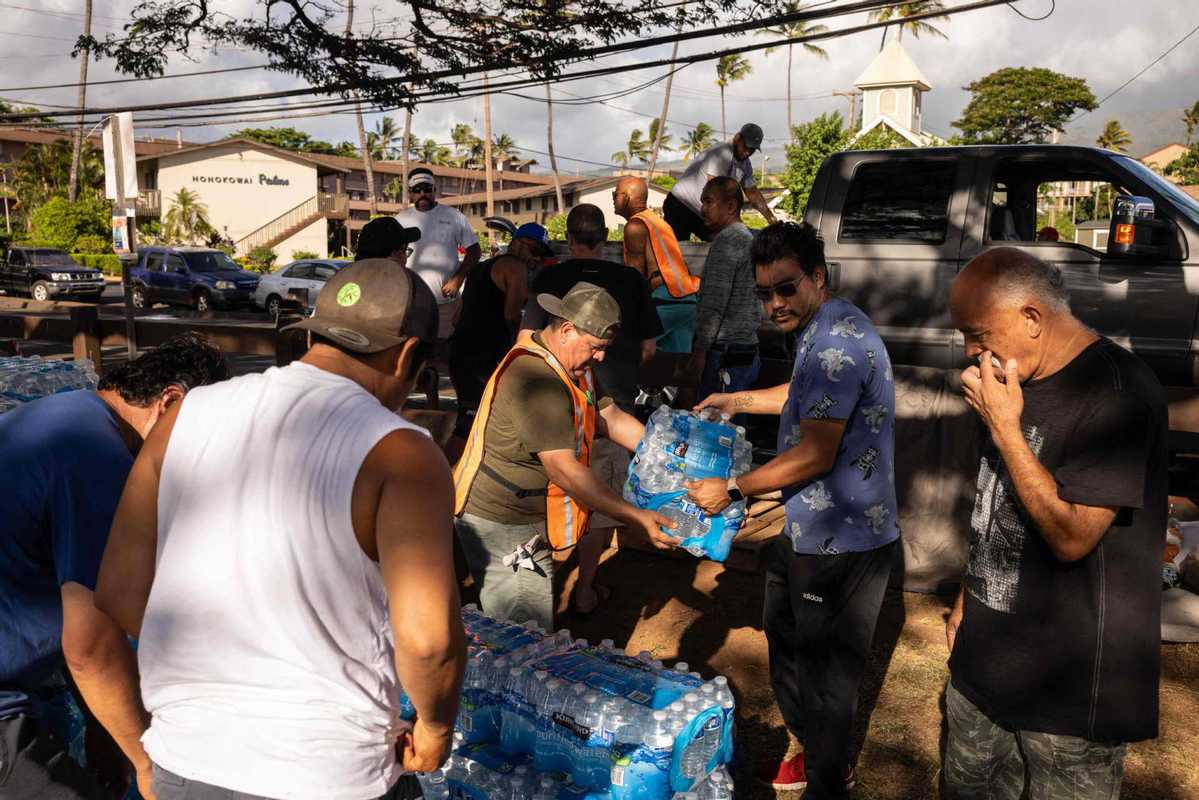Maui official defends not using sirens
By MAY ZHOU in Houston | chinadaily.com.cn | Updated: 2023-08-18 10:21

With 111 bodies found and more than 1,000 people still unaccounted for from the devastating Maui wildfires in Hawaii that burned most of the historic town of Lahaina, the chief of the island's emergency management agency defended his decision not to activate sirens amid wildfires.
When asked if he regretted not sounding the sirens, Chief Herman Andaya said at a news conference Wednesday, "I do not."
He also defended his decision to send out alerts only via mobile devices, radio, television and the county's opt-in resident alert system.
Andaya said the blaring sirens are typically reserved for tsunami warnings, and that Hawaiians are trained to seek higher ground when they are set off.
"Had we sounded the siren that night, we're afraid that people would have gotten mauka [toward the mountains], and if that was the case, then they would have gone into the fire," Andaya said.
There are about 80 sirens to warn people in case of major disasters, and they are mostly along the coast. Andaya said that there are no sirens on the mountainside where the fire was spreading down "so even if we sounded the sirens, [it] would not have saved those people on the mountainside''.
Some people claimed that their neighbors and loved ones could have been saved if an overt warning had been issued before they noticed the flames moving fast toward their homes. Some tourists and residents said that they didn't receive cellphone alerts telling them to evacuate.
Maui County Mayor Richard Bissen and Hawaii Governor Josh Green defended Andaya, and Green said that he too would expect a tsunami if he heard the sirens.
"Did mistakes happen? Absolutely," Green said at the news conference. "We view this as a way to learn and to share, in this case from our tragedy, to share how to best protect people across the planet."
Hawaii Attorney General Anne Lopez said in an Aug 11 statement that her office will conduct a "comprehensive review of decision-making and standing policies" and is "committed to understanding the decisions that were made before and during the wildfires".
With about 80 percent of Lahaina destroyed by the fire, Hawaii health officials said that a cleanup of toxic materials will likely take weeks, if not months.
"It's going to be a long time," state toxicologist Diana Felton told Hawaii Public Radio.
Over the next two weeks, Felton said teams led by the Environmental Protection Agency (EPA) will work to remove obvious hazards such as propane tanks from the area.
There is a high chance that many of Lahaina's older buildings contained lead paint or asbestos because the town was built well before the 1970s. Those materials are likely still present in the fire debris and could make contact with skin or accidentally be inhaled. Arsenic, which was used in the 20th century as an herbicide on sugar and pineapple plantations, is also a concern.
Residents were advised not to return to their homes too soon and to wear protective clothing, N95 masks and gloves if they want to recover whatever they can.
"These areas should be approached very carefully, very cautiously," Felton said.
Other experts say that the toxic soot left by the fire is another issue. Toxic ash and dust can be stirred back into the air months later. Rain may wash the toxic materials into the water system if not cleaned from the soil in time.
"If it's not cleaned up properly, it can be released to the environment in different ways," Newsha Ajami, a water expert at Lawrence Berkeley National Laboratory, told The Washington Post. "Next rainfall, next storm potentially can wash it off to the ocean or actually impact the groundwater, depending on the location. So it's a big challenge."
Some residents of Maui are reporting that investors and real estate agents are trying to capitalize on the wildfires to purchase their land.
The governor said Wednesday that he told the state attorney general to work toward a moratorium on land transactions in Lahaina to protect local landowners from being "victimized" by opportunistic buyers. He acknowledged the move might face legal challenges.
"My intention from start to finish is to make sure that no one is victimized from a land grab," Green said at the news conference. "People are right now traumatized. Please do not approach them with an offer to buy their land. Do not approach their families saying they'll be much better off if they make a deal. Because we're not going to allow it."























